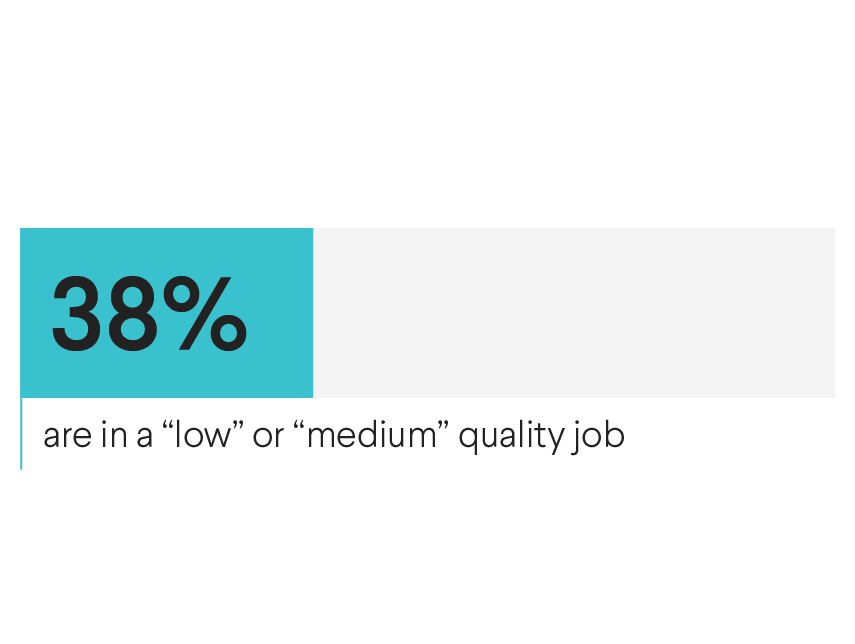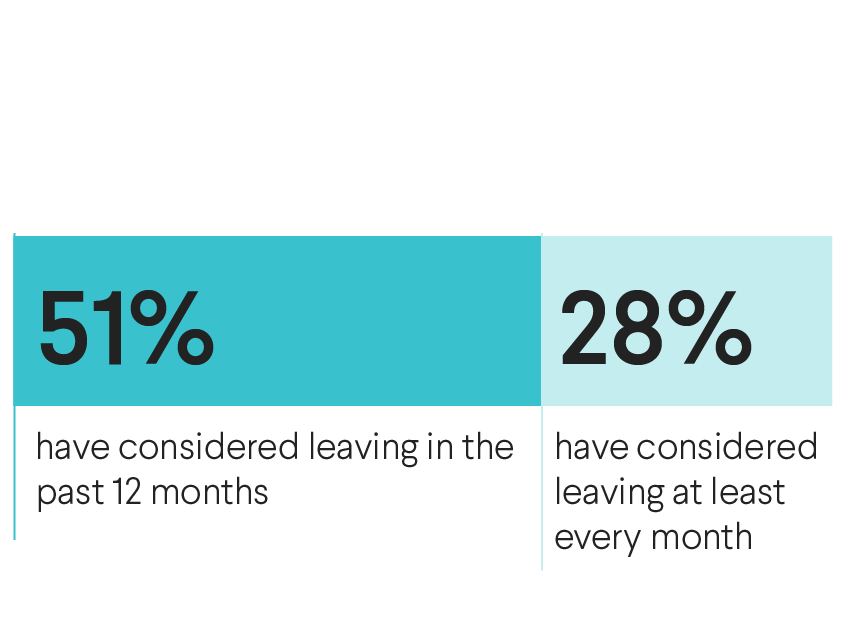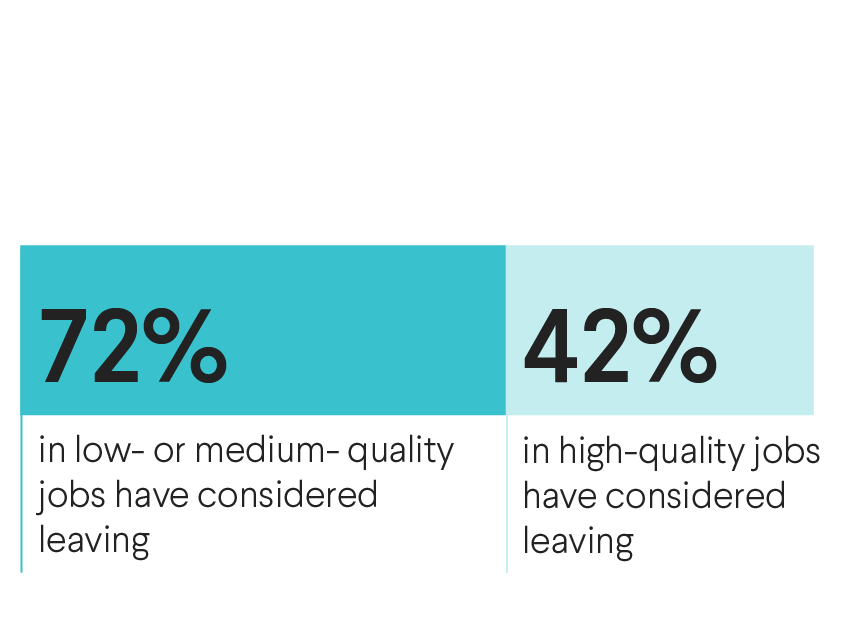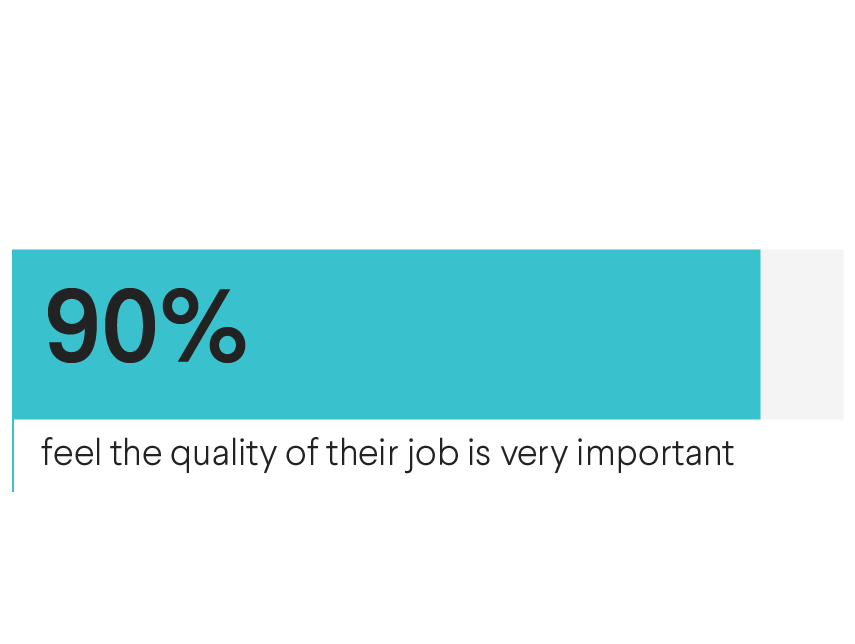Jobs for the Future Is Your Partner for Advancing Job Quality in Your Community
The Need
Too many workers labor at jobs that don’t offer competitive pay, benefits, stability, opportunities for growth, and a safe, supportive, engaging work environment. People who face barriers to economic advancement are more likely to experience these challenges. If we want to drive economic success for people, businesses, and communities, a focus on connecting people to quality jobs, and not just any job, is a necessity.
What We Know About Job Quality
More than half of the people in the U.S. labor force—92 million workers—don’t have a quality job and face barriers to economic advancement. Nearly half of the occupations projected to see the fastest growth between 2021 and 2031—including frontline positions in health care and the service and transportation industries—don’t meet our quality standards based on compensation levels. And there are far too many jobs, with little opportunity for career or economic advancement, that employers could make into quality jobs but don’t.
The data below comes from JFF’s Quality Jobs Survey conducted by Morning Consult.
Why, As A Community Leader, Should I Take Action?
As a leader in your community you care about:
Creating a vibrant local economy
When people like their jobs, they stay longer and are more productive, helping businesses perform better.

Building trust with your community
Job quality is an issue that can bring many stakeholders to the table to engage, learn from each other, and create lasting change.

Attracting financial resources to support your important work
The federal government, many states, and philanthropy are including requirements and criteria around job quality in their grant opportunities.

Keeping up with and staying relevant within a quickly changing economy
Job quality is more important than ever: for workers demanding higher wages and better benefits, employers seeking to retain employees, and in light of new technologies like AI that are changing our relationships with work.

Using powerful data to inform decision-making and influence stakeholders
Job quality can help us move beyond historical metrics of success, think more deeply, and be more effective at supporting workers and learners.

Why JFF?
We are committed to achieving our North Star goal: By 2033, 75 million Americans facing barriers to economic advancement will have quality jobs. We can’t do it alone. We need your help to reach this goal together.
Our Approach: Community Co-Design of Quality Jobs
As workforce leaders ourselves, we are learning how to identify and confront the challenges baked into our policies, procedures, and practices. As part of this shift, we recognize that the transformed labor market has left our current models of training workers and connecting them to employment inadequate for the communities we serve. JFF is collaborating with communities to deploy approaches grounded in human-centered design and worker voice.
 Community-Informed Research
Community-Informed Research
We believe it’s imperative to partner with workers on what job quality means to them. In the same way that worker voice encourages practitioners to involve people most impacted by decisions to be involved in the research and development process, JFF is committed to engaging our community—those closest to the problem—to define job quality in a clear and impactful way and identify concrete, tangible approaches for improving it within your communities.
 Community-Wide Strategic Alignment
Community-Wide Strategic Alignment
Advancing job quality in your community can’t be an isolated effort. We believe that an engaged, empowered, broad coalition is best positioned to advance job quality in any region. By uniting partners around a shared definition, common goals, and a preliminary strategy, we can gain community-wide traction, convene more effective partnerships, advance policy, and secure funding to move key job quality priorities.
 Iteration and Prototyping
Iteration and Prototyping
We know that there is no one-size-fits-all model for implementing job quality initiatives. Iteration is a critical principle in this work. Rapid prototyping helps reduce those costs and allows leaders to fail fast and pivot to test better solutions quickly.
The Double Diamond Model:

Adapted from the Nielsen Norman Group
How to Define a Quality Job
In 2023, JFF developed a framework providing a comprehensive definition of a quality job that highlights what all workers deserve in addition to good pay and benefits—the flexibility, autonomy, stability, and advancement opportunities that are essential for people to thrive.
One thing is clear: Employers must provide for their employees’ most basic needs, and that starts with offering fair and equitable compensation, which means paying all workers a living wage that enables them to comfortably support themselves and their dependents at the local cost of living in their communities.
In addition to compensation, the JFF Quality Jobs Framework identifies three other elements that are essential components of a quality job and a quality workplace: advancement, structure, and agency and culture.

-
 Compensation
CompensationAll forms of pay, benefits, and leave that enable all workers to support themselves and their dependents at the local cost of living.
-
 Advancement
AdvancementThe policies and practices that provide all workers with equitable opportunities to grow their skills, knowledge, and careers within their organization or industry.
-
 Agency & Culture
Agency & CultureThe extent to which all workers are encouraged and supported to use their expertise to drive change within their organization and have a sense of belonging and value in the workplace.
-
 Structure
StructureThe foundational elements that support a safe, healthy, and stable environment for all workers.
The framework provides a comprehensive definition of quality jobs that goes beyond the foundational elements of pay and benefits to offer a more comprehensive picture of what every worker needs: flexibility, belonging, autonomy, stability, and pathways to advancement.
Our Impact
Job Quality Champions: Communities Leading the Way
 |
EmployIndy’s initial efforts in entering the Job Quality Academy focused on expanding career pathways in Marion County's construction industry. The program prioritized increasing access, skills acquisition, and career advancement opportunities for 18-to-30-year-olds who have been underrepresented in this sector. |
|
Through collaboration with team members and partners, it emerged that four critical sub-sectors—HVAC, carpentry, plumbing, and electrical—presented their own unique challenges and approaches. Their consensus was that they needed regional alignment to effectively address these sector-specific disparities. For their next steps, the EmployIndy team will undertake a thorough review of existing adult education models to assess the necessity for local enhancements, the potential requirement for additional resources to expand programs, and to identify which new partners should be involved to advance these objectives. |
|

|
The Kentucky Workforce Innovation Board invested in actively engaging stakeholders through participatory research efforts. They orchestrated a statewide listening tour, gathering insights from a wide range of partners, including employers, public officials, and employees. |
|
This collaborative approach helped to distill essential themes for strategic state planning. Additionally, they’ve effectively incorporated a variety of perspectives into their teaming model. Their signature “Job Quality Champions” meetings, designed to broaden community engagement beyond their core team, included vibrant dialogues on recognizing employer credentials. By thoroughly preparing and welcoming many contributions, they’ve made significant strides in job quality efforts and fostered a collective sense of ownership over job quality principles. Ultimately, the Kentucky Workforce Innovation Board identified small and medium manufacturers as their primary market to focus on and will explore developing tools to help educate employers about job quality. |
|
|
The Pennsylvania State Workforce Board integrated principles from the JFF Quality Jobs Framework into its state-level request for proposals (RFP) for industry partnership grants. |
|
Many team members from the Job Quality Academy, who also influence state policy, contributed to incorporating the framework’s four core tenets: Compensation, Advancement, Agency and Culture, and Structure. Proposals that incorporated these elements received additional points, reinforcing the state’s commitment to embedding the tenets of quality jobs within their procurement process. |
|

|
Workforce Snohomish and the Oregon Higher Education Coordinating Commission, representing separate Washington and Oregon teams, had identified many of the same industries to focus their job quality work on: construction, manufacturing, information technology, and health care. |
|
Seeing that Workforce Snohomish and the Oregon Higher Education Coordinating Commission shared not only industries but also many of the same stakeholders, given their geographic proximity, they joined forces mid-academy. |
|
Take Action
JFF and our collaborators are piloting and scaling implementation models that improve job quality around the country. Wherever you are in your job quality journey, we can help you and your community advance your vision.
Seed ideas and connect with peers in the Job Quality Solutions Lab:
The Job Quality Solutions Lab is a half-day co-design experience that uses real-world challenges to crowdsource and share potential solutions. We do this by:
- Designing (slightly) fictionalized scenarios for different personas (state workforce agency admin, regional nonprofit director, small business owner, etc.).
- Running a facilitated design-thinking exercise with like-minded leaders to assess challenges and generate new solutions.
- Hosting the universe of co-created solutions in a virtual library (coming soon).
- Hosting “train-the-trainer" sessions for leaders to facilitate Solution Labs in their communities.
- Customizing Solution Labs experiences for your unique community.
Accelerate your solutions with the Job Quality Action Lab:
Based on the Job Quality Academy experience JFF hosted in 2023, the Job Quality Action Lab is a two-and-a-half-day team-based intensive meant to take job quality ideas from concept to reality. We do this by:
- Facilitating a series of design-thinking exercises around assembling a core team of committed stakeholders, identifying customer and community needs, identifying points of leverage and impact, and how to measure success.
- Learning from innovators in workforce development and education who’ve made significant progress in advancing job quality in their work.
- Supporting teams with tailored tools and 1:1 coaching.
- Rapidly testing, receiving peer feedback, and iterating on potential strategies unique to your needs.
Contact us to learn more about how JFF can customize a Job Quality Action Lab experience for your community, region, or state.
Join Us
Through projects like those, JFF and collaborators are piloting and scaling implementation models that improve job quality around the country. In the spirit of co-design, connect with us to provide feedback on tools, help us iterate our approach to advancing quality jobs, or just learn more about this ongoing work.









